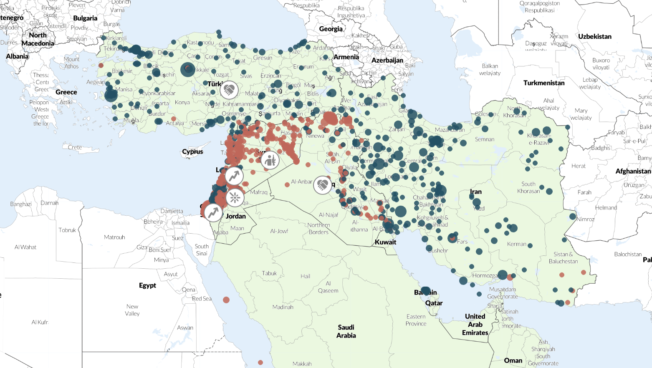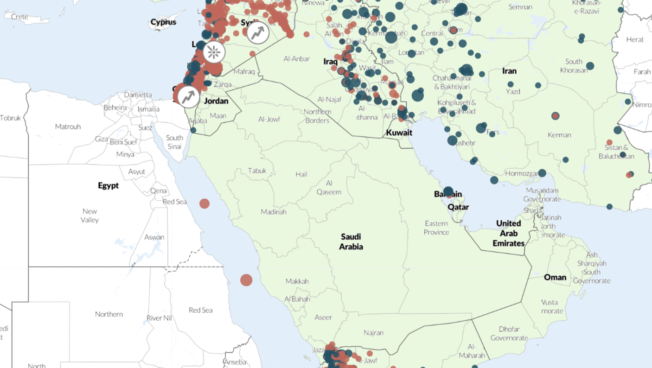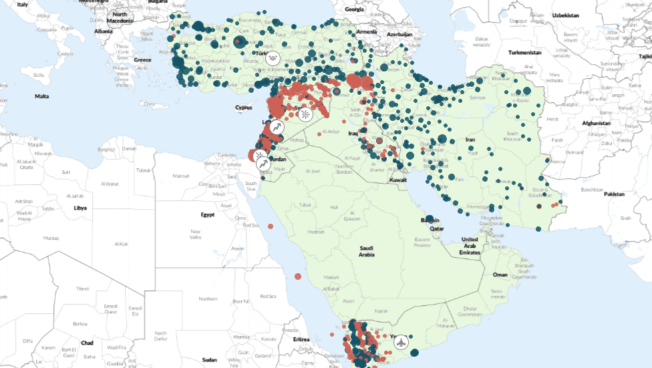Regional Overview
Middle East
December 2023
Posted: 12 January 2024
 Iran: Baluch militant groups target Iranian security forces in Sistan and Baluchistan
Iran: Baluch militant groups target Iranian security forces in Sistan and Baluchistan
In December, Baluch separatist militants carried out a series of deadly attacks targeting security forces in Iran. Sunni Baluch militant group Ansar al-Furqan attacked two police stations on 3 and 6 December in Sistan and Baluchistan province, killing seven police officers. In another incident, a booby trap planted by the same armed group exploded on 19 December, killing an Islamic Revolutionary Guard Corps (IRGC) officer. Since August 2023, four further attacks have been conducted by Ansar al-Furqan militants in Sistan and Baluchistan province, marking a resurgence of the militant group’s activity in the restive southeastern province. The group, which formed in 2013 and claims to be fighting for the rights of Sunni Iranians and ethnic Baluchis, had not been active since December 2018.1BBC Monitoring, ‘Sunni militant group claims ‘terrorist attack’ in southeast Iran,’ 6 December 2018
Meanwhile, Jaysh al-Adl (Army of Justice) militants, another Sunni Baluch group with ties to Ansar al-Furqan, also launched an attack on a police station in Rasak city in Sistan and Baluchestan on 15 December. The five-hour gun battle resulted in the reported deaths of 11 Iranian police officers and two militants. The attack was one of the deadliest events targeting security forces in Iran in recent years. The Pakistan-based Baloch separatist group that was formed in 2012 is designated as a ‘terrorist organization’ by both Iran and the United States.2Haroon Janjua, ‘Why did US declare an anti-Iran group terrorist?’ Deutsche Welle, 7 May 2019 Although Iran and Pakistan established a joint rapid reaction force after a series of attacks on both sides of the border, the continued attacks are indicative of remaining security gaps.3Amwaj Media, ‘Deadly Sunni militancy in southeastern Iran puts spotlight on Pakistan,’ 19 December 2023
 Iraq: Provincial elections proceed largely peacefully despite Sadrist boycott
Iraq: Provincial elections proceed largely peacefully despite Sadrist boycott
Iraq’s provincial elections held on 18 December, the first since 2013, witnessed isolated instances of electoral violence amid intensive security deployments. Electoral violence reflected ongoing tensions between Iraq’s dominant Shiite political blocs but did not result in a significant increase in overall levels of violence from November to December. Levels of violence during the provincial elections were comparable to those seen during the 2021 parliamentary elections, and included several attacks with explosives and light weapons targeting candidates and party offices in major cities, as well as isolated cases of attacks on voting stations. However, the choice of targets was different in 2023 due to current intra-Shiite tensions. Attacks in 2023 targeted the offices of parties affiliated with the Shiite Coordination Framework. Notably, Sadrist mobs vandalized Hikma party offices, while unknown militants damaged Dawa party offices with RPGs.
Meanwhile, Sadrists enforced the electoral boycott announced in November. Sadrist protesters supported the boycott, while the movement’s armed wing expelled members who did not comply with the boycott. Despite the boycott, voter turnout was 41%,4Al Jazeera, ‘Iraq’s governing Shia alliance strengthened in provincial elections,’ 20 December 2023 compared to 42%5Kurdistan24, ‘Iraq’s electoral commission reports just over 42 percent voter turnout,’ 10 October 2021 in 2021. Sadr’s rivals in the Coordination Framework secured at least 101 seats out of 285, in part due to the Sadrist boycott.6Reuters, ‘Iraq’s Shi’ite ruling alliance wins more than 100 local council seats,’ 20 December 2023 Tensions between Sadrists and the Coordination Framework have been high since the sides failed to reach a power-sharing agreement after the 2021 elections.
 Gaza Strip: Israel expands operations to central and south Gaza
Gaza Strip: Israel expands operations to central and south Gaza
The Qatar-mediated truce between Hamas and Israel that went into effect on 24 November collapsed on 1 December, with Israel accusing Hamas of failing to release hostages and firing rockets toward Israeli towns.7Oliver Slow, ‘Why has the Gaza ceasefire come to an end?,’ BBC News, 1 December 2023 In the northern Gaza Strip, armed clashes between the Israel Defense Forces (IDF) and Hamas militants moved into the neighborhoods of al-Tuffah and al-Darraj, while Hamas continued its asymmetric attacks in Beit Hanoun, Jabaliya, and Shujaiya despite the IDF’s overall establishment of operational control over these areas. Meanwhile, the IDF expanded its ground invasion into central and southern Gaza. Fighting was mainly concentrated in al-Maghazi, al-Burayj, and al-Nusayrat refugee camps in central Gaza, and in and around Khan Yunis in southern Gaza. During December, armed clashes in the Gaza Strip increased by nearly 50% in comparison to the month prior.
 West Bank: Decline in violence despite persisting fears of a serious escalation
West Bank: Decline in violence despite persisting fears of a serious escalation
Meanwhile, in the West Bank, Israeli forces continued their security operations in hotspots of militant activity, including the Jenin refugee camp, where 12 militants were killed in a 60-hour operation that started on 12 December. The overall number of armed clashes decreased by nearly 9% in December compared to the preceding month, while confrontations between Israeli forces and unarmed Palestinian rioters also decreased by at least 23% in December. The total number of reported fatalities in the West Bank declined by over 50% during the past month. Despite the overall decline in the level of violence in December, the security situation in the West Bank remains volatile. Reports indicate that Israeli security chiefs have warned Prime Minister Benjamin Netanyahu that the West Bank is on the verge of a Third Intifada. Tensions in the West Bank have been exacerbated by deteriorating economic conditions, as Israel withholds tax revenue owed to the Palestinian Authority and refuses to allow thousands of Palestinians in the West Bank to return to work in Israel and the settlements.8Times of Israel, ‘IDF brass said to warn political leaders that West Bank on brink of violent eruption,’ 9 January 2024
 Syria: Hostilities between Israel and pro-Iran militias continue
Syria: Hostilities between Israel and pro-Iran militias continue
Israeli warplanes targeted Hezbollah, regime, pro-Iran militias, and IRGC positions in southern Syria throughout December in at least 11 incidents, killing at least eight pro-Iran and Hezbollah fighters, as well as a senior IRGC commander on 25 December. On 29 December, Israeli warplanes attacked Damascus International Airport, putting it out of service just one day after it had resumed operations. The airport had been closed for a month after an Israeli airstrike on 26 November caused extensive damage. Israel has targeted Damascus and Aleppo airports several times since the start of the Israel-Gaza conflict to prevent the smuggling of weapons shipments to pro-Iran militias.
Meanwhile, pro-Iran militias launched two rocket attacks on the occupied Golan Heights, where rockets were either intercepted by the Iron Dome or fell into uninhabited areas. On 28 December, a drone attack by Islamic Resistance in Iraq targeted an Israeli settlement in the occupied Golan. Elsewhere, the Islamic Resistance in Iraq and other pro-Iran militias continued their attacks on Global Coalition and US bases, with at least 27 shelling and drone attacks recorded throughout December compared to 23 the preceding month.
 Yemen: Houthi Red Sea attacks lead to the first direct confrontation between Houthi and US forces
Yemen: Houthi Red Sea attacks lead to the first direct confrontation between Houthi and US forces
On 31 December, US helicopters returned Houthi fire and sank three Houthi boats in the southern Red Sea, in the first direct confrontation with mutual engagement between the two forces. The incident took place as helicopters from two US warships were dispatched to answer the distress call of a container ship. Houthi forces claimed that the confrontation, which led to the reported deaths of 10 of the group’s fighters, took place as they were protecting maritime navigation and preventing Israel-linked ships from passing through the Red Sea.9X @army21ye, 31 December 2023 The incident took place after a dramatic surge in Houthi attacks against international shipping throughout the month, which prompted companies to reroute their ships around the Cape of Good Hope, adding between seven and 10 days to their journey. The 18 December announcement of the US-led multinational Operation Prosperity Guardian to confront the Houthi threat has done little to deter the group’s attacks. Houthi forces say they have resorted to attacking international shipping in the Red Sea to show support to Palestinians after their drone and missile attacks against Israel failed to affect the country. Most notably, in November, Houthi forces successfully hijacked a vehicle carrier.
See More
See the Codebook and the User Guide for an overview of ACLED’s core methodology. For additional documentation, check the Resource Library. Region-specific methodology briefs can be accessed below.
Links:







